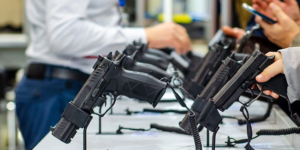
Edmund J. Susman Jr., a seasoned federal agent tasked with protecting diplomats and investigating terrorist threats, finds himself in an unexpected legal battle. Despite holding a top-secret security clearance and years of distinguished service, Susman has been prohibited from purchasing firearms due to a nearly decade-old voluntary mental health evaluation—a ban he says violates his constitutional rights.
Susman, 50, voluntarily sought help at a hospital after experiencing suicidal thoughts in 2015. A psychiatrist quickly determined he was not a danger to himself or others, and he was discharged within days. However, unbeknownst to him, the New York State Office of Mental Health reported his name to the FBI’s National Instant Criminal Background Check System (NICS) as a “prohibited person,” barring him from firearm purchases. It wasn’t until a November 2022 firearm purchase denial that Susman became aware of his listing.
In a lawsuit filed in federal court, Susman argues the state’s mental hygiene law is unconstitutionally broad and violates his Second and Fourteenth Amendment rights. He asserts that voluntary mental health evaluations like his should not result in the permanent forfeiture of firearm rights. His attorney, Amy L. Bellantoni, emphasized that individuals are often unaware of their prohibited status until denied during a purchase attempt.
Susman’s case is one of several similar lawsuits challenging New York’s reporting practices. Plaintiffs include veterans, law enforcement officers, and private citizens—all of whom claim they were unfairly listed on the prohibited database after voluntary mental health stays. In one instance, a Niagara County resident was denied a firearm purchase based on a mental health evaluation lasting less than 12 hours.
Critics argue that the state’s interpretation of the SAFE Act—intended to prevent firearms access for those involuntarily committed—overreaches by including those seeking voluntary evaluations. Bellantoni contends this leads to false reporting, disarming individuals without due process.
For Susman, the repercussions extend beyond firearm ownership. His status as a “prohibited person” has jeopardized his security clearances and global travel capabilities, critical to his role with the U.S. State Department. Additionally, he faces the threat of arrest for continuing to possess firearms required for his job.
Susman’s lawsuit seeks to declare parts of the mental hygiene law unconstitutional, prevent enforcement against voluntary admissions, and restore his Second Amendment rights. For now, his ability to continue protecting national security—and exercising his constitutional rights—hangs in the balance.

